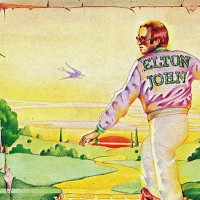With Elton John’s Farewell Yellow Brick Road tour on hold, the former Reginald Dwight has released the most ambitious reissue series of his career. The centerpiece of this project is a set entitled Jewel Box that covers the years 1965-2019. There are 148 tracks, with 60 previously unreleased. Housed in a coffee-table book-size slipcase, the package includes a hardcover booklet and eight CDs. The discs are divided into categories: two CDs of deep cuts, three discs of rarities, two CDs of B-sides and a final disc entitled And This Is Me.
The two compact discs of B-sides, covering the years 1976-1984, are great to have and the two discs of deep cuts are expertly curated by the man himself, but the three discs of rarities covering 1965 through 1971 are the true revelation. There’s no doubt that Elton John bootleggers will be familiar with some of these recordings and fans of his music have no doubt heard the finished studio versions of some of the demos included. Still, the amount of tracks here that have either never been commercially released or properly recorded by John is staggering.
I can’t think of another box set in the compact-disc era that includes so much quality music from one artist that never went beyond the demo stage. Elton John could easily make a proper double album featuring demos he has never recorded. Any enterprising singers out there looking for great unrecorded songs to cover will also find a treasure trove of 61 tracks.
Parts of these three discs also include what amounts to a lost album: Regimental Sgt. Zippo was a proposed debut album recorded in 1968 at DJM Studios. The “studio” was the offices of Dick James Music and included a Neve console and a used four-track Studer tape recorder purchased from Abbey Road studios. James is best known as song publisher for the Beatles, as well as John and Bernie Taupin. The abandoned psychedelic album was never released and instead Elton John released Empty Sky in 1969. An acetate of some of these songs was sold at auction in 2008. There are nine demos here of the 11 finished tracks that would have been on Regimental Sgt. Zippo.
As for other tracks on the rarities discs, some of the demos are credited to the Bread and Beer Band. This was a group with which John recorded an album and a single in February 1969. The songs were produced by Chris Thomas at Abbey Road, before Reg Dwight changed his name to Elton John. A single was released, but the album was never officially put out by a record label. Instead, the project was issued privately by the band. Their Decca single included “Dick Barton Theme (The Devil’s Gallop)” on the A-side and “Breakdown Blues” on the B-side, which both appear on Jewel Box. The single was reissued in 1972 by Decca, while “Breakdown Blues” also appeared on The Mod Scene Volume 2, released by Decca in 1999 in the U.K.
Elton John isn’t kidding when he says “deep cut.” The only Jewel Box songs that are even vaguely familiar to non-hardcore fans are “The Ballad of Danny Bailey (1909-34)” from 1973’s Goodbye Yellow Brick Road, “Mellow” from 1972’s Honky Chateau, and “Have Mercy On the Criminal” from 1973’s Don’t Shoot Me I’m Only the Piano Player, which are all excellent choices. Nearly all of his albums are represented here, with two cuts from several projects and three from both 1975’s Captain Fantastic and the Brown Dirt Cowboy and 2010’s The Union.
John’s B-sides are represented by two discs that neatly recount the period in music when the 45 was still a few years away from having its swan song. Since many of these B-sides only reside on long-out-of- print records, it would have taken persistent collecting to have accumulated them all. Two duets with France Gall are particularly nice to have as well as “Snow Queen,” an overlooked duet with Kiki Dee. John also created a soundtrack companion to his 2019 autobiography Me: Elton John Official Autobiography on the final disc. Since there are so many songs and recordings alluded to in that book, the 16 on Jewel Box are really just a sampling.
This is the third major set that Elton John has released. The others were To Be Continued, a four-disc nox from MCA released in 1990 and Rare Masters, a two-disc set released in 1992 as part of the Chronicles series from Polydor. Jewel Box is more akin to Rare Masters in its inclusion of rarities. Some of them are repeated here and/or have shown up as bonus content on compact-disc reissues of individual albums through the years.
The Jewel Box booklet is as enticing as the music. Beautifully illustrated and filled with memorabilia, it boasts meticulous liner notes and insights directly from Elton John, Bernie Taupin and others. The project was also released in other versions, including a four-LP set and two different three-LP vinyl sets. None of those sets individually, or collectively, include all the music on the eight-compact disc box, however.
It’s remarkable how fully formed John was in his earliest days as a co-songwriter with Bernie Taupin, but even more so as a distinct vocalist. This style made him one of the most recognizable vocalists in the world and solidified his place in music, with his works throughout the ’70s being virtually peerless in quality and commercial success among his fellow singer-songwriters.
Whether you are a casual fan or a hardcore collector, Elton John’s Jewel Box has tremendous appeal. It truly sparkles and shines.




